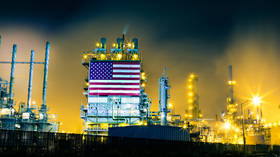American gas ‘inferior’ to Russia’s – Putin
The president notes that US shale gas is much more costly and less reliable than Russia’s pipeline gas
The US has ample opportunity to supply its shale gas to the EU now that Russia’s Nord Stream 1 pipeline has been made inoperable, but this gas is “inferior” to Russian natural gas supplies, President Vladimir Putin said on Wednesday.
“It is quite clear who the beneficiaries [of the Nord Stream incident] are… the US, of course, which can now supply energy resources at high prices… It is now possible for them to force large liquefied natural gas volumes on European countries, which are clearly inferior in competitiveness to Russian pipeline gas,” the President said at the Russian Energy Week forum.
He explained that the prices on US-produced LNG are much higher than those on Russian pipeline gas, “everyone was well aware of this before, and now is even more so,” and added that there are additional risks regarding US deliveries.
“The risks lie in the fact that all this supply is very unstable and can ‘float away’ to other regions,” Putin said, adding that US tankers carrying LNG to Europe may divert from Europe if sellers will be offered a higher price elsewhere.
Putin’s words echo the statements made by French Finance Minister Bruno Le Maire earlier this week. Speaking at the National Assembly, he said that it is unacceptable that the US “sells its liquefied natural gas at four times the price that it sets for its own industrialists” and called for a “more balanced economic relationship on the energy issue” to be established between Brussels and Washington.
Russia used to cover over 40% of the EU’s gas needs prior to the start of the military operation in Ukraine and ensuing sanctions. Supplies dropped dramatically this year, especially after one of the major routes for gas deliveries was severed due to the under-investigation explosions that damaged Russia’s Nord Stream pipelines last month. The US, meanwhile, ramped up its supply of LNG to Europe over the past months, up to a point where it now accounts for nearly half of the bloc’s LNG imports, nearly twice the share recorded in 2021.
For more stories on economy & finance visit RT’s business section
You can share this story on social media:








Comments are closed.